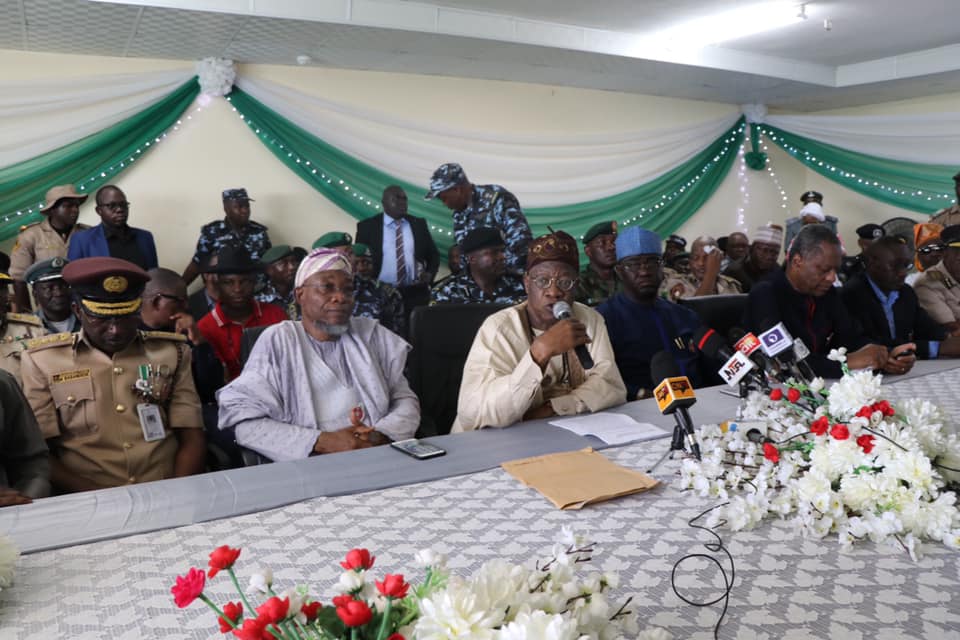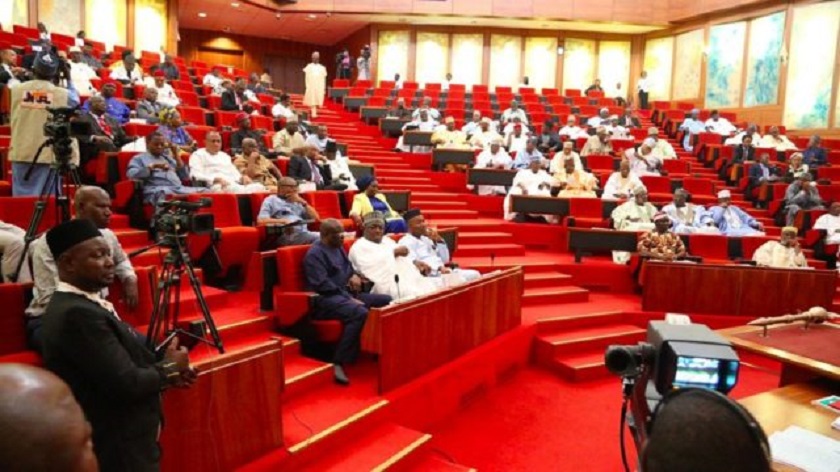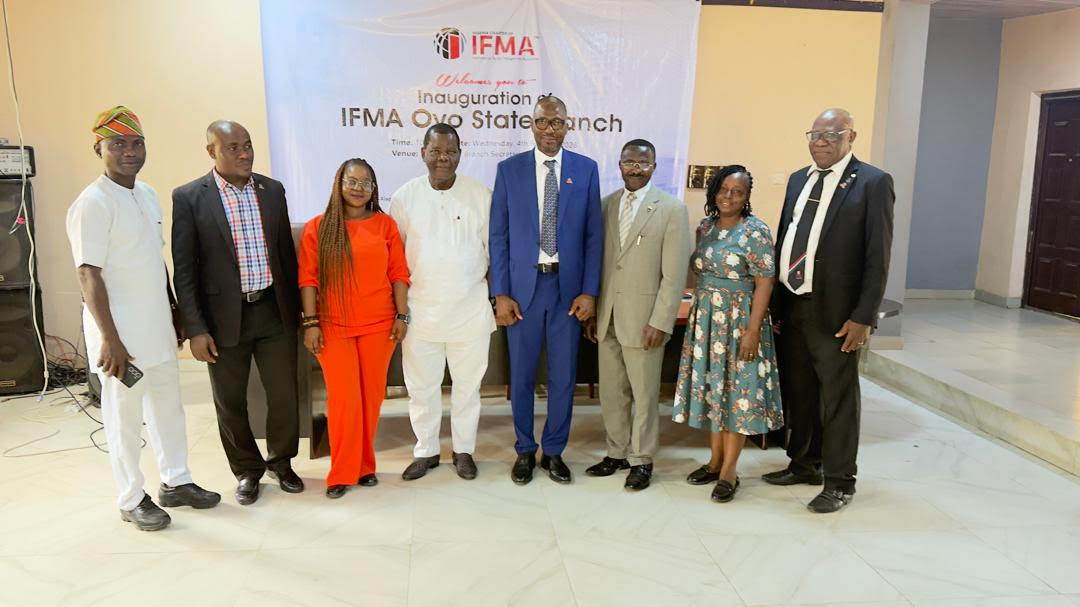General
Border Closure: Nigeria’s Fuel Consumption Drops 30%

By Dipo Olowookere
The federal government has listed some of the gains achieved so far with the closure of the nation’s land borders in four geo-political zones of the country.
Minister of Information and Culture, Mr Lai Mohammed, during a visit to the Seme Border in Lagos, said few of the gains include higher import revenue, lower domestic fuel consumption and increased rice production by local farmers.
He was accompanied to the town bordering Nigeria with Benin Republic by Minister of Foreign Affairs, Mr Geoffrey Onyeama; Minister of Interior, Mr Rauf Aregbesola; Minister of State for Finance, Budget and National Planning, Mr Clement Agba; National Security Adviser, Mr Babagana Monguno; and the Comptroller General of the Nigerian Immigration Service (NIS), Mr Muhammed Babandede.
Since the closure, the monthly import revenue has increased by 15 percent, instead of dropping as expected in many quarters, while the local consumption of fuel has dropped by 30 percent, apparently due to reduced smuggling of the products to neighbouring countries, Mr Mohammed said.
The Minister also said the closure has so far curbed the smuggling of foreign rice into the country, in addition to other prohibited items.
“’There has been an enhanced production and milling of Nigerian rice. Patronage of Nigerian rice has also increased and farmers are expanding their farms as well as engaging more hands,” he said.
The Minister put the value of items seized since the closure at over N3.5 billion, listing such items as including 38,743 of 50kg bags of parboiled foreign rice, 514 vehicles; 1,012 drums filled with PMS, 5,400 Jerrycans of vegetable oil; 346 motorcycles, 10,553 Jerrycans of PMS; and 136 bags of NPK fertilizer used for making explosives.
He also said 296 illegal immigrants have been arrested.
“It is important to note that 95 percent of illicit drugs and weapons that are being used for acts of terrorism and kidnapping in Nigeria today come in through our porous borders.
“However, since this partial closure, these acts have been drastically reduced. Our conclusion is that the arms and ammunition these terrorists and criminal elements were using no longer gain access into the country. In addition, the importation of the drugs which affect the well-being of Nigerians have equally been reduced,” Mr Mohammed said
He said Benin and Niger were not yet doing enough to ameliorate the challenges that led to the border closure, adding that the magnitude of seizures and the number of illegal immigrants recorded in the last two weeks alone confirm this assertion.
“As we speak, we have ships loaded with rice waiting to discharge (in Benin) and the target market is Nigeria (for Christmas). We have (MV Africana Jacana with 40,000 metric tons of rice, MV Zilos with 20,000 mts and MV Sam Jarguar with 45,000 MTS and others,” the Minister said.
He said the border closure would not have occurred if Nigeria’s neighbours had complied with the various MOUs as well as the ECOWAS transit protocols, including the ECOWAS Trade Liberalization Scheme (ETLS).
“Discussions on doing legitimate trade between Nigeria on one hand and Benin and Niger on the other, started in 2005. The discussions have led to MOUs in 2005, 2014, 2015, 2016, 2017 and 2018, all designed to facilitating free movement of goods manufactured in their respective countries and work out the modalities through the Ministers of Trade of both countries for the realization of this objectives.
“It worth noting that there has never been legitimate transit trade between Nigeria and the two countries (Benin and Niger). For clarity, the ECOWAS protocol on transit demands that when a transit container berths at a seaport, the receiving country is mandated to escort same without tampering with the seal to the border of the destination country. Unfortunately, experience has shown that our neighbours do not comply with this protocol.
“Rather, they break the seals of containers at their ports and trans-load goods destined for Nigeria from the original container to trucks. In most cases five containers loaded onto one truck and duty paid as one truck. This improper trans-loading of transit goods makes it impossible to properly examine such goods, resulting in importation of illicit goods, including arms and ammunition, without being detected. Because goods are not examined, mis-classification and resultant loss of revenue become the ultimate consequence of this illegitimate transit trade,” the Minister said.
He said Exercise Swift Response, the joint border security exercise which was launched 20 Aug. 2019, has provided a unique platform for the various participating agencies to jointly operate, thereby strengthening inter-agency collaboration and reducing animosity.
General
NERC Unveils 3-Step Guide for Resolving Electricity Complaints

By Adedapo Adesanya
The Nigerian Electricity Regulatory Commission (NERC) has introduced a streamlined three-step process to help electricity consumers address common issues like power outages, estimated billing, faulty meters, and voltage fluctuations.
In a public advisory shared on its X handle on Tuesday, the electricity sector regulator emphasised that customers should begin by contacting their respective electricity Distribution Companies (DisCos), which serve as the primary point of contact for technical and billing problems.
Consumers are urged to secure a complaint reference number and maintain records of all interactions for efficient follow-up.
The advisory outlines the process as follows: “Contact your DisCo’s customer care – This is the first step for all technical or billing issues;
“Escalate to State Electricity Regulator (SER) – If unresolved, and the consumer is in a state that has transitioned to an SER;
“Reach NERC Call Centre – For consumers in non-transitioned states or needing further assistance. Contact options include 0201 344 4331, 0908 899 9244, or [email protected],” it said.
“We’re here to make sure your complaint is heard and addressed,” the advisory concluded, aiming to empower consumers amid ongoing challenges in Nigeria’s power sector.
This guidance comes as electricity consumers continue to grapple with service disruptions and billing disputes, highlighting NERC’s efforts to improve accountability across DisCos and state regulators.
General
Senate Passes Electoral Act Amendment Bill After Mild Row

By Adedapo Adesanya
The Senate passed the Electoral Act, 2022 (Repeal and Re-Enactment) Bill 2026 on Tuesday after overcoming a rowdy session that saw lawmakers at loggerheads.
The issue in the upper chamber stemmed from a division over Clause 60 raised by Mr Enyinnaya Abaribe, a member of the opposition party, African Democratic Congress (ADC), from Abia South.
The Senate President, Mr Godswill Akpabio, stated that he believed the demand had previously been withdrawn, but several opposition senators immediately objected to that claim.
Citing Order 52(6), the Deputy Senate President, Mr Barau Jibrin, argued that it would be out of order to revisit any provision on which the Senate President had already ruled.
This submission sparked another uproar in the chamber, during which Mr Sunday Karimi had a brief face-off with Mr Abaribe.
The Senate Leader, Mr Opeyemi Bamidele, then reminded lawmakers that he had sponsored the motion for rescission, underscoring that decisions previously taken by the Senate are no longer valid, maintaining that, consistent with his motion, Mr Abaribe’s demand was in line.
Mr Akpabio further suggested that the call for division was merely an attempt by Mr Abaribe to publicly demonstrate his stance to Nigerians. He sustained the point of order, after which the Abian lawmaker rose in protest and was urged to formally move his motion.
Rising under Order 72(1), Mr Abaribe called for a division on Clause 60(3), specifically concerning the provision that if electronic transmission of results fails, Form EC8A should not serve as the sole basis, calling for the removal of the proviso that allows for manual transmission of results in the event of network failure.
During the division, Mr Akpabio directed senators who supported the caveat to stand. He then asked those opposed to the caveat to rise, to which 15 opposition senators stood.
However, when the votes were counted, the Senate President announced that 15 senators did not support the proviso, while 55 senators voted in support.
Earlier, proceedings in the Senate were momentarily stalled as lawmakers began clause-by-clause consideration of the Electoral Act, 2022 (Repeal and Re-Enactment) Bill 2026, following a motion to rescind the earlier amendment.
The motion to rescind the bill was formally seconded on Tuesday, paving the way for the upper chamber to dissolve into the committee of the whole for detailed reconsideration and reenactment of the proposed legislation.
During the session, the Senate President, Godswill Akpabio, reeled out the clauses one after the other for deliberation.
However, the process stalled when at clause 60, Mr Abaribe raised a point of order, drawing immediate attention on the floor.
This soon caused the session to move into a closed-door session.
Before rescinding the Electoral Act, the red chamber raised concerns over the timing of the 2027 general elections and technical inconsistencies in the legislation.
Rising under Order 52(6) of the Senate Standing Orders, the Senate leader, Opeyemi Bamidele, moved the motion to reverse the earlier passage of the bill and return it to the Committee of the Whole for fresh deliberations.
He explained that the development follows the announcement by the Independent National Electoral Commission (INEC) of a timetable fixing the 2027 general elections for February 2027, after consultations with the leadership of the National Assembly.
He stated that stakeholders had raised concerns that the proposed date conflicts with the provisions of the amended law, particularly the requirement that elections be scheduled not later than 360 days before the expiration of tenure.
He further noted that upon critical review of the passed bill, the 360-day notice requirement prescribed in Clause 28 could result in the scheduling of the 2027 Presidential and National Assembly elections during the Ramadan period.
According to him, holding elections during Ramadan could negatively affect voter turnout, logistical coordination, stakeholder participation, and the overall inclusiveness and credibility of the electoral process.
The motion also highlighted discrepancies discovered in the Long Title and several clauses of the bill, including Clauses 6, 9, 10, 22, 23, 28, 29, 32, 42, 47, 51, 60, 62, 64, 65, 73, 77, 86, 87, 89, 93, and 143. The identified issues reportedly affected cross-referencing, serial numbering, and internal consistency within the legislation.
General
IFMA Nigeria Gets Branch in Oyo, Picks Adejumo Olusola Babatunde as Coordinator

By Modupe Gbadeyanka
A new branch of the International Facility Management Association (IFMA) Nigeria Chapter has been established in Oyo State, with Mr Adejumo Olusola Babatunde chosen as Coordinator.
The organisation set up an arm in the South-West state in a bid to expand its footprint in the country. Mr Babatunde will be assisted by other executive committee members, including Mr Ajiboye Olusola Akeem as Secretary, and Mrs Adeniran Olaide as Treasurer.
At the inauguration of the branch at the Nigerian Society of Engineers (NSE) Secretariat in the Akobo area of Ibadan, the Oyo State capital, the president of IFMA Nigeria, Mr Sheriff Daramola, expressed delight at the successful inauguration of the branch and commended members for their commitment to the growth of facility management in Nigeria.
He highlighted IFMA’s global heritage, noting that the association is supporting over 25,000 members in more than 140 countries worldwide. Mr Daramola emphasised IFMA’s strong global network, the world’s largest and most widely recognised association for facility management professionals, headquartered in the United States and its growing influence in Africa, the Middle East and Europe.
“IFMA members have taken positions of authority across federal, state, and private institutions; IFMA Nigeria is positioned to ensure our professionals are the first choice for global investors entering the Nigerian market,” he stated.
The Legal Adviser of IFMA, Nigeria, Mr Sola Fatoki, who shared this sentiment, said, “Since 1997, when IFMA Nigeria was established, the association has equipped facility management professionals with integrated knowledge spanning human behaviour, infrastructure, and the built environment.”
He encouraged engineers, architects, surveyors, ITC, Technology innovators, data analysts and allied professionals to see IFMA as their professional home and outlined the functions and responsibilities of branch executive committees.
In his remarks, Mr Babatunde expressed gratitude to the national council for the opportunity to serve and pledged to ensure the success of the branch, focusing on unity and the professional advancement of stakeholders in the region.
-

 Feature/OPED6 years ago
Feature/OPED6 years agoDavos was Different this year
-
Travel/Tourism10 years ago
Lagos Seals Western Lodge Hotel In Ikorodu
-

 Showbiz3 years ago
Showbiz3 years agoEstranged Lover Releases Videos of Empress Njamah Bathing
-

 Banking8 years ago
Banking8 years agoSort Codes of GTBank Branches in Nigeria
-

 Economy3 years ago
Economy3 years agoSubsidy Removal: CNG at N130 Per Litre Cheaper Than Petrol—IPMAN
-

 Banking3 years ago
Banking3 years agoSort Codes of UBA Branches in Nigeria
-

 Banking3 years ago
Banking3 years agoFirst Bank Announces Planned Downtime
-

 Sports3 years ago
Sports3 years agoHighest Paid Nigerian Footballer – How Much Do Nigerian Footballers Earn














